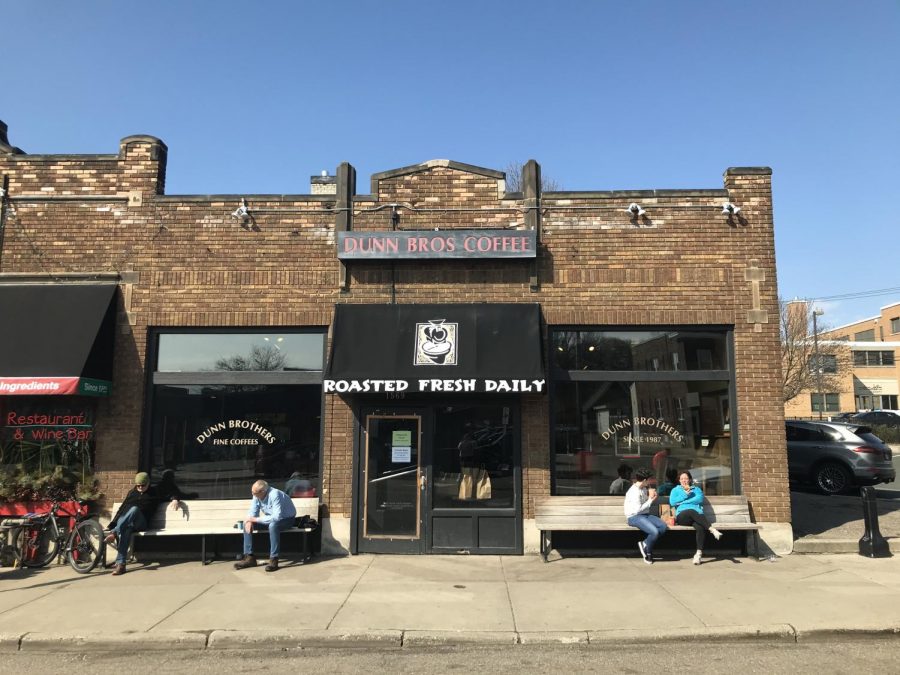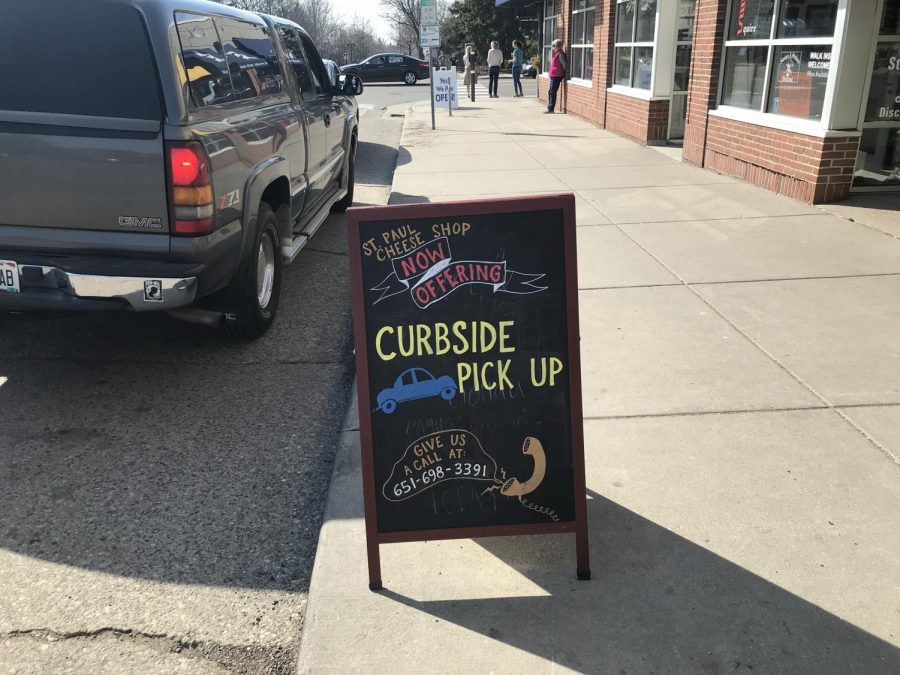Businesses take heavy blows in COVID-19 crisis
The Cheese Shop, a local favorite, advertising their new curbside service. Photo by Hannah Catlin ’21.
March 27, 2020
Two weeks ago, it was business as usual. Now, many small retailers and restaurants in the Macalester periphery are fighting to keep from closing for good.
On March 13, Minnesota Gov. Tim Walz declared a State of Emergency over COVID-19, the disease caused by the novel coronavirus. Within four days, all Minnesota bars, restaurants, coffeehouses, and other places of “public amusement” had been ordered closed until April 3 to limit the virus’s spread. By March 25, those closures had been extended an additional 5 weeks.
That decision has had serious consequences for small business owners and their employees.
“We’re down to a skeleton staff,” Dunn Bros office manager Lueann Hinderaker said. “We weren’t expecting this to happen, and the financial ramifications are pretty big—but we think we can hopefully weather this for a while.”
Dunn Bros, like many other cafes and eateries, is relying on alternative business models to carry sales while customers are barred from dining in.

“We’re shipping beans, and right now we’ll also deliver beans within a three-mile radius and leave them by the door so there’s very little contact,” Hinderaker said. “If it continues, and people keep ordering, that’ll make a really big difference.”
For businesses not included in the closures, the indirect impact has still been significant. Wet Paint co-owner Scott Fares expressed the urgency of the sudden changes.
“It’s crazy,” Fares said. “We had to release all but a couple of our staff, we’ve switched to phone orders and online orders only, and we’re doing curbside pickup… we’re concerned. We’re down to one major supplier.”
Fares has also been working to revitalize the online presence of the shop. He hopes those changes will make it easier for professors and students facing a sudden lack of access to materials.
“If Ruthann Godollei’s printmaking class needs a kit they can order for their homes, we now have the ability to prepare that online in a couple minutes, rather than overnight,” Fares said. “That’s important because through the back door, we service lots of colleges and universities with supplies. We’re moving that to the front as a major source of business.”
Fares said Wet Paint is currently pulling in about half its usual earnings. Not every business is so lucky.
“A lot of my business at this point is from people who are going to the restaurants on Grand Ave., who walk by and choose to drop in,” Hal Johnson ’90, owner of Against the Current Books, said. “People aren’t doing that, and business has plunged to almost zero.”
Against the Current’s monthly expenses for rent and business insurance alone come to approximately $1,700. During the week of March 16, Johnson made $9.
Usually, he said, he makes enough in a month to cover the cost of staying open, with small additional profits. Without that income, he’ll have no choice but to consider shutting down permanently.
“Very small businesses like mine are really at the mercy of whatever government decisions are made right now,” Johnson said. “If there was a significant grant or even loan, then I could consider staying in business. Otherwise I’ll have to close.”
On March 25, St. Paul Mayor Melvin Carter announced a 3.25 million dollar “bridge fund” that would provide grants of $7,500 to small businesses in need and $2,000 to low-income families. Members of the St. Paul City Council noted, however, that given the scope of need in the city, it is likely that not everyone who requires assistance will receive it.
Fares, who is also a board member for the Grand Avenue Business Association (GABA), said St. Paul businesses are also finding ways to support each other during this particularly difficult period.
“[GABA] has an internal and external Facebook page, and we’ve been posting on there on behalf of member and nonmember businesses, trying to use whatever amplification we have to voice ways to support them,” Fares said. “Whether that’s through curbside pickup, or gift cards, or whatever they’re doing.”
Some local businesses have relied on their customer base for financial support instead. Mashal Sherzad, daughter of Khyber Pass Cafe owners Masooda and Emal Sherzad, organized a GoFundMe page asking patrons to “save our family restaurant.”
“With the frightening events surrounding COVID-19, [my parents] are facing financial strife in ways they may not recover from,” Sherzad wrote. “We would be ever so grateful to any contribution you can make.”
The page has raised almost $15,000 in ten days.
Hinderaker has been impressed with the community’s dedication to Dunn Bros, as well.
“A lot of people in the community have called and said, ‘we’re gonna support you, how can we do that,’ Which has been really good, ” Hinderaker said.
That outreach, she said, has been a silver lining to an otherwise relentless couple of weeks. She and Fares are both looking forward to the day they can try to re-hire their staff.
“The emotional toll has been significant,” she said.
“Our staff is all part-time. A lot of them are students, or people who’ve been with us for a really long while. And we’ve had to say to them that we just don’t know what’s going to happen… now we’re just doing as much as we can for as long as we can.”














